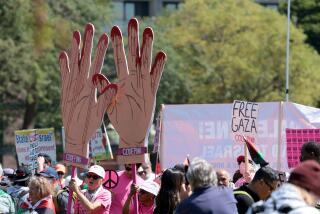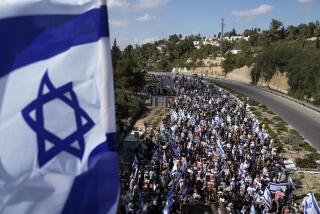Iraqi Children March in a Well-Orchestrated Parade
- Share via
BAGHDAD — The children, dressed up for the occasion in their best clothes, formed units that stretched into a column half a mile long. Waiting for the order to begin marching, groups of youngsters took cues from their teachers and rehearsed various chants.
A group of 4-year-olds waving small paper banners over their heads screamed at the top of their frail voices: “With our blood and our souls we will defend Saddam Hussein!”
The 4-year-olds were among about 3,000 Iraqi children who marched Tuesday to the offices of the U.N. Development Program, a three-story yellow-brick mansion overlooking the Tigris River in the center of Baghdad, in a highly coordinated show of support for their president.
The children disembarked from a convoy of blue-and-white South Korean-made buses minutes before 4 p.m., as was precisely predicted earlier in the day by the Iraqi Information Ministry, for their 500-yard march to the U.N. headquarters.
“Nobody told me to come,” Akhmad Aki, a 12-year-old student of the Saladin al Sabar school, said as a group of his classmates lined up, waiting for instructions. Half a dozen teachers, all women with scarves covering their heads, ran around checking the children’s banners. “I want to defend my land against America,” Akhmad continued in almost emotionless Arabic. “We will have intifada here like in Palestine. And now I will go and shout, ‘Down U.S.A.’ ”
And shout he did, almost immediately launching into a frenzied chant with his class.
Breathing heavily, Seif Hussein, a small boy in another group, managed to get out his name but found it impossible to remember how old he was. A teacher bent down to him, and he quickly offered that he “came here to say to America not to destroy my school.”
A 12-year-old girl blinked tear-stained eyes and clutched a big portrait of her mother with a black ribbon in the upper right-hand corner.
“Talk to her,” a teacher beckoned to a reporter. Referring to an international embargo imposed on Iraq for more than a decade, she added, “Her mother died of cancer because of the sanctions.”
The teacher prompted the girl to tell her story in English. “My,” said the teacher. “Mother.” The girl repeated the words. “Died of cancer,” the black-clad teacher said. As a tear rolled down her cheek, the girl spoke in rapid Arabic. Everybody sighed, with relief, and the proud minder translated that the youngster’s mother had died of cancer four years ago because of the sanctions.
After the march, the children, tired of walking, began boarding the buses. A sad, plump boy in a wheelchair sat on the sidewalk, seemingly forgotten.
He cheered up immediately when spoken to and said in good English that his name was Abdurakhman Saad. “I am sick,” he continued in Arabic. “I can’t be cured because of sanctions.”
His father, Saad Faik, a former Oil Ministry official now on a government pension, explained that in the past, his son had been treated by Cuban doctors in Baghdad but that because of the sanctions they had left.
“No one can help my son now,” he said in a low, resigned voice. “Why are they doing it to us? What has my son done wrong?”
When asked whether it is good to use 4-year-old children in such rallies, he said: “Children don’t need to know much about politics. All they need to know is that peace is better than war.”
More to Read
Sign up for Essential California
The most important California stories and recommendations in your inbox every morning.
You may occasionally receive promotional content from the Los Angeles Times.













